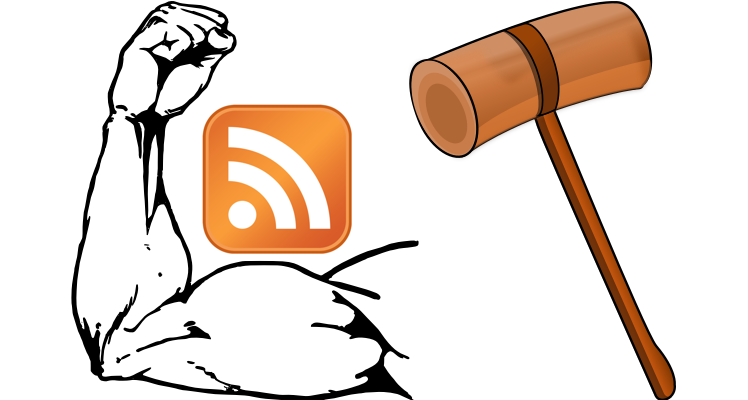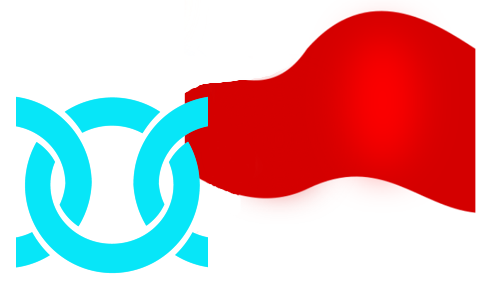Feedlinks is a system for spreading content efficiently among servers, while making the content easily accessible to users from a single app.
RSS (Really Simple Syndication) is a method for pretty much doing the same thing, so what's the difference? Why create or use Feedlinks, when we already have RSS?
To make the case one way or the other, let's first do a quick recap of how RSS works. RSS is an XML-based web format, used to publish a list of content or posts, typically on a blog or news site. The list does not contain the full post information, but rather a short synopsis and some meta data about the post. Being XML-based, RSS is not intended to be consumed directly in the browser, but rather by a user app that aggregates a number of RSS feeds; the user loads their app with their choice of RSS feeds, so that they only get posts or news from sources they choose. RSS feeds get updated as the source/publisher adds more content, and the user app scans the feeds periodically looking for updates. RSS has been around for decades, and many news outlets and government agencies still maintain feeds.

So RSS is well established, why do we need something new? I'm afraid the kindness train for RSS ends here. It's true that RSS is a tried and true technology, but to say it's a highly successful technology is a stretch at best. Why? Well for the most part it's due to it never really gaining mainstream success; it's always been a sort of fringe technology that some people know about, but the vast majority don't. Considering it serves a similar purpose to X/Twitter and Facebook, was around for many years before each, and still most people don't know about it or use it, says to me that its time to shine has long since passed. If you agree or don't but still don't necessarily think we need something to replace RSS, read the rationale behind The Feedlinks Project.
Before we get an idea of how Feedlinks is a viable replacement for RSS (and other technologies), let's first look at some of the issues that have held back RSS over the years.
- This one may seem a little shallow, but the simple fact RSS runs on XML, pretty much makes the point right there. These days JSON rules web services of all kinds; if you're not using JSON and don't have a good reason, developers aren't interested. If developers aren't interested, then apps will not be made to access your service, and all but the most loyal will stay away.
- There is no common standard. There are several different standards (some more compatible than others), and nearly all of them are still in use! Think you can create an interpreter for one RSS site, and you're good to go from there? Wrong! Your RSS app must be able to handle two or three different variants; even then there are no ground rules for posts. No guidelines or best practices. Some have images, some have links, some are long, some are short, some use numeric IDs, and some use alphanumeric.
- It's not very smart. What's on the feed is what you get. There's no searching, and no filtering by date. You get the whole feed every time you poll it, and have no way to say "hey, only send me what's new please". In fact having to poll in the first place is pretty clunky; sure it's a pretty common method, but it would be nice to have some real-time technology like SSE or Web Sockets.
- It's one-way only. Users consume and view, but you as a publisher get very little insight in return. You don't know much at all about who is consuming your feeds, which posts they like best, or if the feed is generating any real traffic to you main site. If someone arrives from an RSS app, to the publisher that's a new person. Even if a publisher doesn't know who you are, it would help them to know that you got there via the feed; that perhaps you come back regularly for certain articles, or that you never read articles that aren't in the feed.
- Getting new feeds in your app is annoying. First there isn't an established way of finding RSS feeds. You first need the URL of a feed, and then you need to add it to your RSS app. If your app doesn't have a browser build in, you have to find the link and copy and paste it in. It's bad enough there but it's worse when you don't know where the feeds are in the first place. How do you know what feeds are out there? How do you know if this feed is something you'd like? How can you trust this feed to not spam you, dish out misinformation, or display offensive content?

How is Feedlinks different then? Essentially by addressing all the points above and more. Feedlinks employs a JSON-based REST API, which dynamically adjusts its response based on what the user app needs. Only need the newest posts, ok no problem. Only want posts from last week, you got it. Want a specific post from two years ago; if you know the ID then you got it. Feedlinks are designed to be shared and published. A Feedlink may be listed on any number of Feed Sources, but always linked back to the source content. This allows publishers to have their feeds spread far and wide organically, while ensuring they still get the traffic, and information that comes with it.
Speaking of information, as a publisher you get so much more from Feedlinks. Instead of just seeing when a feed is downloaded or an article read, you now get feedback on when posts are viewed, and the source clicked. Better information about who is reading what and when, gives you as a publisher the info needed to produce better content.
Feedlinks is designed with user accounts in mind, which automatically helps out with authentication for creating new feeds and posts, but also for helping publishers know which articles you like more than others. Don't want to sign in? No problem, Feedlinks has anonymous and semi-anonymous modes built-in.
Feedlinks are super easy to share, and so are Feed Sources. Just scan a QR code on a website or your friend's Feedlinks app, or copy and paste the link to feel some nostalgia for RSS.
Finally, Feedlinks is designed to power all types of modern media and social media apps. The protocol is standardized, and contains support for not just current must-have features like posting and sharing, but also future needs as they're considered. RSS could have powered the present, but instead in-fighting and stagnation have left it a living fossil. It's time to learn the lessons RSS can teach us, and begin to look forward with Feedlinks.
 Alright, one last nod to RSS before we go. In order to fill out initial content and demonstrate Feedlinks in real-world scenarios, Feedlinks at time of writing supports adding RSS feeds to Feedlinks. The goal obviously is for those RSS feeds to switch over to Feedlinks, to make our lives easier, but we have to start somewhere. Many thanks to all those outlets that dutifully update their RSS feeds on regular basis, never knowing whether it's a person reading it, or just some bot. Pssst, Feedlinks can help with that!
Alright, one last nod to RSS before we go. In order to fill out initial content and demonstrate Feedlinks in real-world scenarios, Feedlinks at time of writing supports adding RSS feeds to Feedlinks. The goal obviously is for those RSS feeds to switch over to Feedlinks, to make our lives easier, but we have to start somewhere. Many thanks to all those outlets that dutifully update their RSS feeds on regular basis, never knowing whether it's a person reading it, or just some bot. Pssst, Feedlinks can help with that!
